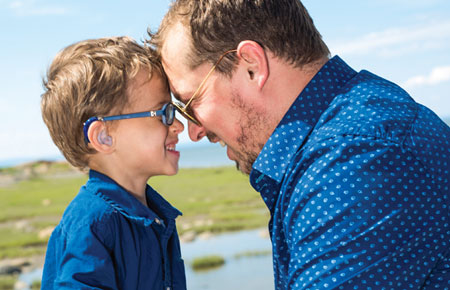Literacy and Deaf / Hard of Hearing
Communication is the right that every individual has, and is necessary for full engagement in all aspects of their lives. Communication is uniquely and intensely personal. The world we live in constructs layers and layers of communication, usually built around speaking/listening styles. Children who are deaf or hard of hearing have unique challenges acquiring a language. Early and consistent access to a language is vital to its acquisition and continued development. Hearing loss complicates access to language. However, there are several strategies that are most often employed to build communication skills. There is no single test or exam that can determine which strategy is right for an individual. Understanding and spending time exploring options will allow the child to own the strategy best suited for them.
Children with hearing loss can learn to communicate in a number of ways. Examples of communication options include:
- American Sign Language and Written and/or Spoken English;
- Natural Gestures, Listening, Speech (Lip) Reading, Spoken Speech;
- Auditory-Oral;
- Auditory-Verbal Therapy;
- Listening, Spoken Speech;
- Cued Speech;
- Conceptually Accurate Signed English (CASE);
- Signing Exact English (SEE);
- Finger Spelling; and
- Manually Coded English (MCE).
Some families of children with hearing loss may choose to communicate using American Sign Language, a distinct language with its own grammar and syntax that uses hand signs and gestures, body movements, and facial expressions to represent words and phrases. Other families may choose approaches that build upon the English language when communicating. Cued Speech combines the natural lip movements of speech with hand shapes representing phonetic sounds, providing additional visual cues so that sounds such as “p” and “b” or “f” and “v” can be distinguished. Other families may choose to use the Auditory-Verbal Therapy. Here, a child uses his or her natural hearing ability, along with lip-reading and hearing devices, to enhance speaking and language skills.
Because language development begins early, selecting the approach that is the best match for the child's needs should be done early and interact using that approach should be done frequently. Getting feedback and suggestions from professionals about communication options can help with navigating all the options available. Professionals may include:
- Audiologist,
- Otolaryngologist,
- Pediatrician,
- Speech and Language Pathologist, or
- Early Intervention Provider.
Hearing loss can affect a child's ability to develop speech, language, and social skills. The earlier a child who is deaf or hard-of-hearing starts getting intervention and services, the more likely the child's speech, language, and social skills will reach their full potential.
It's important to keep in mind what works best for each family. Some families choose a single approach, while other find a combination works best for them.
